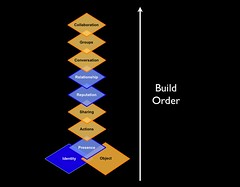Selective Sociality and Social Villages
The web provides wonderful serendipity on many fronts, but in this case it brought together two ideas I have been thinking about, working around, and writing about quite a bit lately. The ideas intersect at the junction of the pattern of building social bonds with people and comfort of know interactions that selective sociality brings.
The piece that struck me regarding building and identifying a common bond with another person came out of Robert Paterson's "Mystery of Attraction" post (it is a real gem). Robert describes his introduction and phases of getting to know and appreciate Luis Suarez (who I am a huge fan of and deeply appreciate the conversations I have with him). What Robert lays out in his introduction (through a common friend on-line) is a following of each other's posts and digital trail that is shared out with others. This builds an understanding of each others reputation in their own minds and the shared interest. Upon this listening to the other and joint following they built a relationship of friendship and mutual appreciation (it is not always mutual) and they began to converse and realized they had a lot more in common.
 What Robert echos is the Elements in Social Software and its build order. This build order is common in human relationships, but quite often social software leaves out steps or expects conversations, groups, and collaboration to happen with out accounting for the human elements needed to get to this stage. Quite often the interest, ideas, and object (all social objects) are the stimulus for social interaction as they are the hooks that connect us. This is what makes the web so valuable as it brings together those who are near in thought and provides a means to connect, share, and listen to each other. I really like Robert's analogy of the web being like university.
What Robert echos is the Elements in Social Software and its build order. This build order is common in human relationships, but quite often social software leaves out steps or expects conversations, groups, and collaboration to happen with out accounting for the human elements needed to get to this stage. Quite often the interest, ideas, and object (all social objects) are the stimulus for social interaction as they are the hooks that connect us. This is what makes the web so valuable as it brings together those who are near in thought and provides a means to connect, share, and listen to each other. I really like Robert's analogy of the web being like university.
Selective Sociality of Villages
The piece that resonated along similar threads to Robert's post is Susan Mernit's "Twitter & Friend Feed: The Pleasure of Permissions". Susan's post brings to light the value of knowing who you are sharing information with and likes the private or permission-based options that both Twitter and FriendFeed offer. This selective sociality as known Local InfoCloud of people and resources that are trusted and known, which we use as resources. In this case it is not only those with whom we listen to and query, but those with whom we share. This knowing who somebody is (to some degree) adds comfort, which is very much like Robert Patterson and Luis Suarez#039; villages where people know each other and there is a lot of transparency. Having pockets where our social armor is down and we can be free to share and participate in our lives with others we know and are familiar to us is valuable.
I am found these two pieces quite comforting as they reflect much of what I see in the physical community around me as well as the work environments I interact with of clients and collaborators. The one social web service I have kept rather private is Twitter and I really want to know who someone is before I will accept them as a connection. This has given me much freedom to share silly (down right stupid - in a humorous way) observations and statements. This is something I hear from other adults around kids playgrounds and practices of having more select social interactions on line in the services and really wanting to connect with people whom they share interests and most often have known (or followed/listened to) for sometime before formally connecting. Most often these people want to connect with the same people on various services they are trying out, based on recommendation (and often are leaving a service as their friends are no longer there or the service does not meet their needs) of people whom they trust. This is the core of the masses who have access and are not early adopters, but have some comfort with the web and computers and likely make up 80 to 90 percent of web users.
[Comments are open (with moderation as always) on this post at Selective Sociality and Social Villages :: Personal InfoCloud]
